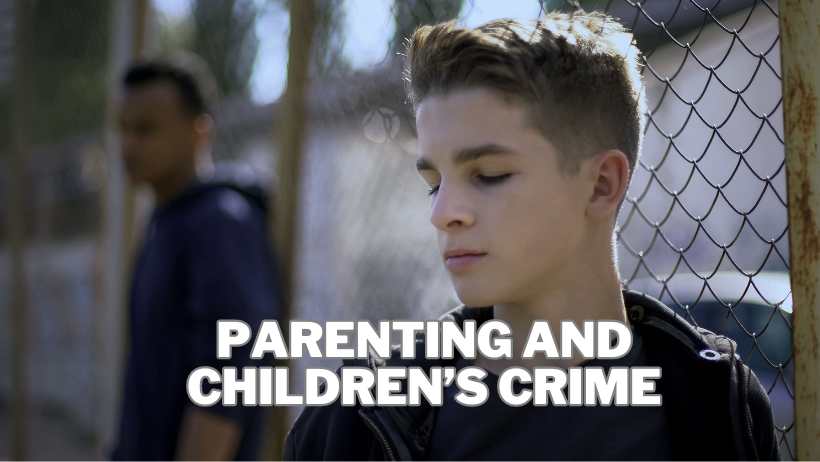
Should parents be held responsible for their children’s crimes? This thought-provoking article explores the arguments for and against parental accountability, the challenges in holding parents responsible, the role of legal systems, social and cultural perspectives, psychological aspects, and alternative approaches to parental accountability.
In a society where accountability plays a vital role, the question of whether parents should be held responsible for their children’s crimes arises. This thought-provoking topic delves into the complex dynamics between parental influence and the actions of their children. As we explore the potential ramifications and implications of such a responsibility, we are compelled to question the extent of a parent’s role in shaping their children’s behavior and whether they should bear the burden of their child’s transgressions.

Argument for holding parents responsible
Parents have a duty to teach their children right from wrong
Parents play a crucial role in teaching their children about morality and ethics. They are responsible for instilling values and principles that guide their children’s behavior. Teaching children right from wrong is not only an ethical duty but also a societal obligation. Parents are the primary educators in a child’s life, and they have the opportunity to shape their children’s worldview and moral compass. By emphasizing the importance of honesty, empathy, and respect, parents can equip their children with the necessary tools to make responsible decisions and avoid engaging in criminal activities.
Parents have a significant influence on their children’s behavior
Studies have consistently shown that parents have a profound influence on their children’s behavior. From a young age, children observe and imitate their parents’ actions and attitudes. Whether consciously or unconsciously, parents shape their children’s beliefs, values, and behavioral patterns. If parents exhibit criminal behavior or endorse illegal activities, their children are more likely to adopt these behaviors as well. Holding parents responsible for their children’s actions acknowledges the undeniable influence they have on their development and encourages them to prioritize positive role-modeling and responsible parenting.
Holding parents accountable can prevent future crimes
By holding parents responsible for their children’s crimes, society can encourage proactive measures that aim to prevent future offenses. Parents who are aware of the potential consequences of their negligence or lack of guidance may be more inclined to actively engage in their children’s lives and take preventive measures. The fear of facing legal ramifications or societal scrutiny may motivate parents to create a nurturing and structured environment that promotes positive behavior. By emphasizing the importance of parental responsibility, we can contribute to a safer and more crime-free society.
Parents should bear the consequences of their failure to raise responsible children
When parents fail to fulfill their duty of raising responsible children, it is only fair that they bear some of the responsibility for the resulting consequences. Children rely on their parents for guidance, support, and protection. If parents neglect or are unable to provide the necessary care and guidance, it can have serious repercussions on their children’s lives. Holding parents accountable for their failure to raise responsible children provides a sense of justice and acknowledges the impact their parenting has on the overall well-being of their children and society at large.
Challenges in holding parents responsible
Determining the extent of parental influence
One of the challenges in holding parents responsible for their children’s actions is determining the extent of parental influence. While parents undeniably play a significant role in shaping their children’s behavior, it is important to acknowledge that external factors also contribute to a child’s development. Peers, media, and other social influences can impact a child’s decision-making process. Therefore, it is vital to carefully assess the degree of parental influence before placing the entire blame on parents.
Difficulty in proving parental negligence
Proving parental negligence can be a complex task, as it requires substantial evidence to establish that the parents failed to meet their obligations. Negligence can manifest in various forms, including lack of supervision, failure to address behavioral issues, or disregard for their children’s well-being. However, gathering concrete evidence to prove parental negligence can be challenging, especially when it comes to subjective aspects of parenting, such as emotional support or communication.
Potential unfairness in punishing parents for their children’s actions
Holding parents accountable for their children’s crimes can raise ethical concerns regarding fairness and individual responsibility. Parents may argue that they had limited control over their children’s actions, especially as they grow older and become more influenced by external factors. Additionally, some parents may genuinely attempt to provide the best environment for their children, but circumstances beyond their control may lead to undesirable outcomes. Striking the right balance between parental accountability and acknowledging external factors is crucial in ensuring fairness and avoiding undue punishment.
Striking a balance between accountability and empathy
Another challenge in holding parents responsible is striking a balance between accountability and empathy. While accountability is essential to promote responsible parenting and prevent future crimes, it is important to consider the unique circumstances each family may face. Supporting parents with various resources, such as education, counseling, and community programs, can help address underlying issues and empower parents to make positive changes. Emphasizing empathetic approaches alongside accountability is crucial to ensure the well-being of both parents and children.

Legal systems and parental responsibility
Existing laws on parental liability for children’s actions
Different legal systems have varying approaches to parental liability for children’s actions. Some jurisdictions have laws that hold parents strictly liable for their children’s offenses, irrespective of their own involvement or negligence. Other legal systems adopt a more nuanced approach by considering factors such as parental intent, prior knowledge, or the level of control parents have over their children. The existence of these laws recognizes the importance of parental responsibility and aims to prevent future crimes by holding parents accountable.
Variations in legal frameworks across different jurisdictions
Legal frameworks concerning parental responsibility vary significantly across different jurisdictions. Cultural, social, and historical factors often shape these variations. Some countries prioritize the collective responsibility and support networks, focusing on ensuring the overall well-being of children rather than solely blaming parents. Others emphasize individual responsibility and view parental accountability as a means to deter negligence and promote safer communities. Understanding these variations is crucial to develop effective strategies for holding parents responsible while considering the unique circumstances in each jurisdiction.
The role of legal systems in deterring parental negligence
Legal systems play a crucial role in deterring parental negligence by establishing laws and regulations that serve as a deterrent. The threat of legal consequences can motivate parents to take their responsibilities seriously and actively engage in their children’s lives. By clarifying the legal expectations placed on parents, legal systems create a framework that encourages parents to prioritize their children’s well-being and actively prevent criminal behavior. However, it is essential to strike a balance between accountability and support, ensuring that legal measures do not place an undue burden on parents or exacerbate existing vulnerabilities.
Possible legal reforms to strengthen parental responsibility
To strengthen parental responsibility, legal reforms can be considered. These reforms may include stricter penalties for parents who demonstrate gross negligence, increased access to parenting education programs, or the implementation of a comprehensive support network for families at risk. By combining punitive measures with proactive support, legal systems can effectively address parental negligence and promote a safer environment for children. Continual evaluation and refinement of legal reforms are essential to ensure their effectiveness and avoid unintended consequences.
Social and cultural perspectives
Cultural differences in defining parental responsibility
Cultural perspectives play a significant role in shaping the understanding and expectations of parental responsibility. Different cultures have varying views on the role of parents in their children’s lives, which can impact their understanding of parental accountability. Some cultures prioritize the collective responsibility of raising children, viewing parents as part of a broader support network that includes extended family and community members. Others focus more on individual responsibility and expect parents to bear the sole burden of raising responsible children. Recognizing and respecting these cultural differences is crucial when addressing parental responsibility from a societal standpoint.
Social stigmatization and support for holding parents accountable
Social stigmatization can affect the societal support for holding parents accountable for their children’s crimes. Some may argue that publicly shaming and stigmatizing parents may contribute to further marginalization and hinder their ability to positively influence their children. However, others contend that social pressure and public scrutiny can act as a strong deterrent, motivating parents to take their responsibilities seriously and actively prevent criminal behavior. Striking a balance between holding parents accountable and providing adequate support is essential to avoid exacerbating existing vulnerabilities and stigmatization.
Impact of socio-economic factors on parenting and crime prevention
Socio-economic factors play a significant role in parental responsibility and crime prevention. Families facing financial hardship or living in disadvantaged communities may encounter additional challenges in raising responsible children. Limited resources, inadequate access to education, and lack of opportunities can hinder parents’ ability to provide a nurturing environment. Recognizing these socio-economic factors and addressing the underlying inequalities is crucial in promoting effective crime prevention strategies and ensuring that parents are adequately supported in their parenting journey.
The importance of community and societal support
The responsibility of raising responsible children should not solely rest on the parents’ shoulders; it should be a collective effort involving community and societal support. Communities play a crucial role in providing resources, support networks, and educational opportunities for parents. By fostering a sense of collective responsibility, communities can contribute to the prevention of crimes and the promotion of positive parenting practices. Encouraging collaboration between schools, healthcare systems, social services, and community organizations is vital in creating a united front to support parents in their quest to raise responsible children.

Psychological aspects
Exploring the link between parental behavior and child delinquency
Psychological research has consistently demonstrated a strong link between parental behavior and child delinquency. Parents who exhibit aggressive, neglectful, or abusive behaviors are more likely to have children who engage in criminal activities. The influence of parenting styles, such as authoritative, permissive, or neglectful, can significantly impact a child’s behavior and decision-making skills. Understanding this link is essential in formulating effective strategies that address the root causes of criminal behavior and provide appropriate interventions for both parents and children.
The role of parenting styles in shaping children’s behavior
Parenting styles have a significant impact on children’s behavior and development. Authoritative parenting, characterized by setting boundaries, offering guidance, and fostering open communication, has been associated with positive outcomes and reduced delinquency rates. On the other hand, permissive and neglectful parenting styles have been linked to increased delinquency and problematic behavior. Recognizing the influence of parenting styles on children’s behavior can inform interventions and support systems that encourage positive parenting practices and discourage harmful ones.
Understanding the impact of neglect and abuse on criminal tendencies
Neglect and abuse during childhood can have profound and long-lasting effects on an individual’s propensity to engage in criminal behavior. Children who experience neglect or abuse often face significant emotional and psychological challenges that can contribute to a range of negative outcomes, including criminal tendencies. Understanding the specific mechanisms through which neglect and abuse influence criminal tendencies can aid in the development of targeted interventions and support systems that address the underlying trauma and promote healing.
Psychological interventions to address parental influence on crime
Psychological interventions can play a significant role in addressing parental influence on crime. Therapeutic approaches such as family therapy, parenting programs, and trauma-informed interventions can help parents develop healthier parenting skills, resolve conflicts within the family, and address underlying psychological issues. By providing parents with the necessary tools and support, psychological interventions can contribute to creating a positive and nurturing environment that reduces the risk of criminal behavior and promotes overall well-being.
Alternative approaches to parental accountability
Early intervention and prevention programs
Early intervention and prevention programs can significantly contribute to addressing parental accountability. By identifying families at risk and providing them with support and resources at an early stage, these programs can help prevent potential criminal behavior. Early intervention can include initiatives such as home visits, parenting education, access to affordable childcare, and mental health support. Investing in these preventative measures can have long-term benefits for both parents and children, fostering a supportive environment that promotes responsible parenting and reduces the likelihood of future crimes.
Targeted support for at-risk families
Targeted support for at-risk families plays a pivotal role in ensuring parental accountability. Many families face unique circumstances, such as substance abuse, domestic violence, or mental health issues, which can hinder their ability to provide a safe and nurturing environment for their children. By providing these families with tailored support services, such as counseling, rehabilitation programs, or housing assistance, society can address the underlying causes of parental negligence and empower parents to make positive changes.
Educating and empowering parents to promote positive behavior
Education and empowerment are essential components of promoting parental accountability. Providing parents with access to parenting education programs that emphasize positive discipline, effective communication, and conflict resolution can equip them with the necessary skills to raise responsible children. Additionally, empowering parents through support networks, mentorship programs, and advocacy initiatives can provide them with the confidence and resources to overcome challenges and actively engage in their children’s lives.
Collaborative efforts between schools, communities, and parents
Collaborative efforts between schools, communities, and parents are vital in promoting parental accountability. Schools can play an active role by providing resources, workshops, and educational programs that involve parents in their children’s education and overall development. Communities can contribute by offering support networks, after-school programs, and initiatives that promote positive parenting practices. By fostering collaboration and communication between all stakeholders, a comprehensive approach to parental accountability can be achieved, maximizing the positive impact on children’s lives and reducing the likelihood of criminal behavior.
Ethical considerations
Balancing individual responsibility with societal accountability
Ethical considerations arise when attempting to strike a balance between individual responsibility and societal accountability. While parents bear primary responsibility for raising their children, society has a vested interest in promoting child well-being and preventing criminal behavior. Finding the right balance between holding parents accountable and providing support acknowledges the complexities of parenting and ensures that the child’s best interests are upheld while maintaining societal order.
The potential for punishment to worsen family dynamics
Punishment as a means of holding parents responsible for their children’s crimes must be approached with caution. Harsh or excessive punishment may further deteriorate family dynamics and exacerbate existing vulnerabilities. It is important to consider alternative approaches that prioritize rehabilitation, education, and supportive measures. Preservation of family relationships should be a priority to provide a conducive environment for positive change and prevent additional harm to both parents and children.
Fairness in assigning blame to parents for their children’s actions
Assigning blame to parents for their children’s actions raises questions of fairness. Factors beyond the parents’ control, such as external influences or individual psychological differences, can contribute to a child’s criminal behavior. It is essential to distinguish between parental negligence and circumstances beyond their control. Fairness can be achieved by considering the parents’ efforts, their willingness to seek help, and their commitment to addressing any underlying issues that contribute to their child’s delinquency.
Ensuring the well-being of both children and parents
In discussions of parental responsibility, it is crucial to prioritize the well-being of both children and parents. Holding parents responsible should not lead to the further marginalization or stigmatization of families in need. Instead, interventions and support systems should be designed to address the root causes of parental negligence and promote the overall well-being of both children and parents. Balancing accountability with support and empathy is vital to ensure the best interests of all parties involved.
Effects on child development
The impact of parental responsibility on child learning and growth
Parental responsibility significantly influences child learning and growth. When parents actively engage in their children’s lives, provide a stable and supportive environment, and model positive behavior, children are more likely to thrive academically, socially, and emotionally. Conversely, when parents neglect or fail to prioritize their children’s well-being, it can hinder their development and increase the likelihood of engaging in criminal behavior. Recognizing the impact of parental responsibility on child development underscores the importance of holding parents accountable for nurturing responsible individuals.
Potential long-term consequences of parental accountability
While parental accountability can have positive effects on preventing future crimes, it is essential to consider potential long-term consequences. Punitive measures that solely focus on blame and punishment may strain familial relationships, perpetuate cycles of violence and criminality, or negatively impact parental mental health. Counterproductive outcomes can be mitigated by implementing supportive measures, rehabilitation programs, and tailored interventions that address the underlying causes of parental negligence and promote positive change.
Mitigating negative effects through supportive measures
Mitigating the negative effects of parental accountability requires the implementation of supportive measures. Providing access to mental health services, parenting education, financial assistance, and community resources can help parents address their own challenges, reduce the risk of criminal behavior, and create a nurturing environment for their children. Identifying and addressing systemic barriers that hinder parents’ ability to fulfill their responsibilities is crucial in ensuring that parental accountability does not exacerbate existing vulnerabilities or perpetuate cycles of neglect.
Considering the best interests of the child
When discussing parental responsibility, it is essential to prioritize the best interests of the child. The focus should be on providing a safe, nurturing, and supportive environment that promotes the child’s well-being and allows for their healthy development. Approaching parental accountability with the best interests of the child in mind helps ensure that interventions and support systems are tailored to address their unique needs and circumstances. This child-centered approach is crucial to break cycles of crime, abuse, and neglect, and empower children to lead fulfilling and law-abiding lives.
International perspectives on parental responsibility
Comparing approaches to parental liability in different countries
International perspectives on parental liability differ significantly across countries. Some nations emphasize strict parental liability, holding parents responsible for their children’s crimes directly and without exemptions. Others adopt a more nuanced approach that considers parental intent, neglect, or control. Cultural, social, and legal factors contribute to the variations in these approaches. By comparing and learning from different countries’ experiences, policymakers and lawmakers can develop comprehensive strategies that address parental responsibility in a manner that aligns with their specific societal contexts.
Cultural, legal, and social factors influencing international perspectives
Cultural, legal, and social factors significantly influence international perspectives on parental responsibility. Cultural norms and traditions shape societal expectations of parenting, which in turn influence legal frameworks. Legal systems are guided by cultural and social values, which define and shape the concept of parental responsibility. Understanding these factors is crucial in developing effective approaches to parental accountability that resonate with a particular society’s values, while still upholding fundamental principles of child protection and welfare.
Promoting global dialogue on effective strategies for holding parents accountable
Promoting a global dialogue on effective strategies for holding parents accountable is essential. Sharing research findings, policy successes, and challenges can foster greater understanding and cooperation between countries. Through international platforms, policymakers, researchers, and practitioners can exchange knowledge, identify common areas of concern, and collectively work toward developing evidence-based strategies that acknowledge the nuances of parental responsibility and are tailored to specific societal contexts. Such global collaboration can contribute to the development of comprehensive, equitable, and culturally sensitive approaches to parental accountability.
Learning from successful international practices
Learning from successful international practices can provide valuable insights into effective strategies for holding parents accountable. Countries that have implemented comprehensive support systems, early intervention programs, and family-focused initiatives can serve as models for others seeking to improve their approaches to parental responsibility. By analyzing the outcomes, challenges, and lessons learned from these successful practices, policymakers can identify transferable elements that can be adapted and implemented in their own jurisdictions. A willingness to learn from each other’s experiences can lead to continuous improvement and the development of best practices in parental accountability.
Conclusion
The question of whether parents should be held responsible for their children’s crimes is a complex one that demands careful consideration of various factors. While parents have a primary responsibility to teach their children right from wrong and have a significant influence on their behavior, challenges exist in determining parental influence, proving negligence, and ensuring fairness. Legal systems, social and cultural perspectives, psychological aspects, and alternative approaches play crucial roles in addressing parental accountability.
Ethical considerations, child development effects, international perspectives, and the need for continued research and dialogue further complicate the issue. To create a balanced approach that benefits society and children, it is essential to understand the multifaceted nature of parental responsibility and work toward supporting parents while prioritizing the well-being of children. Continued research, collaboration, and the sharing of successful practices can contribute to the development of effective strategies that hold parents accountable while fostering positive family dynamics and preventing future crimes.


















